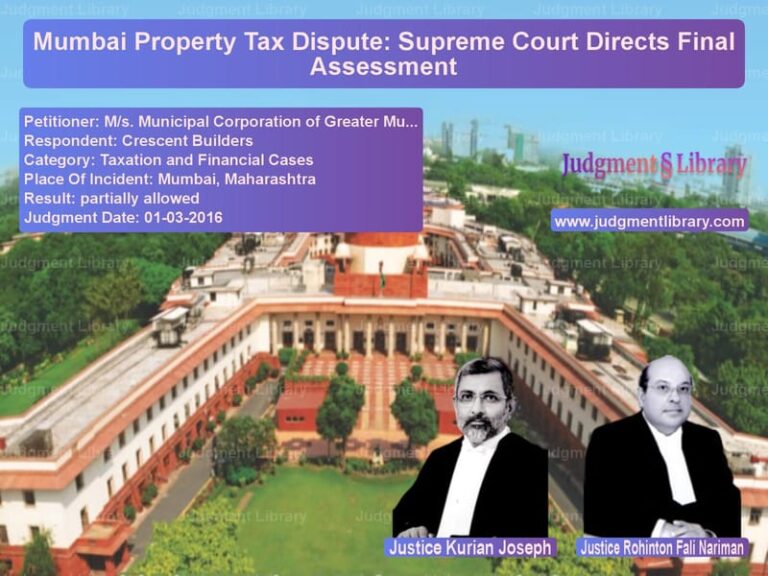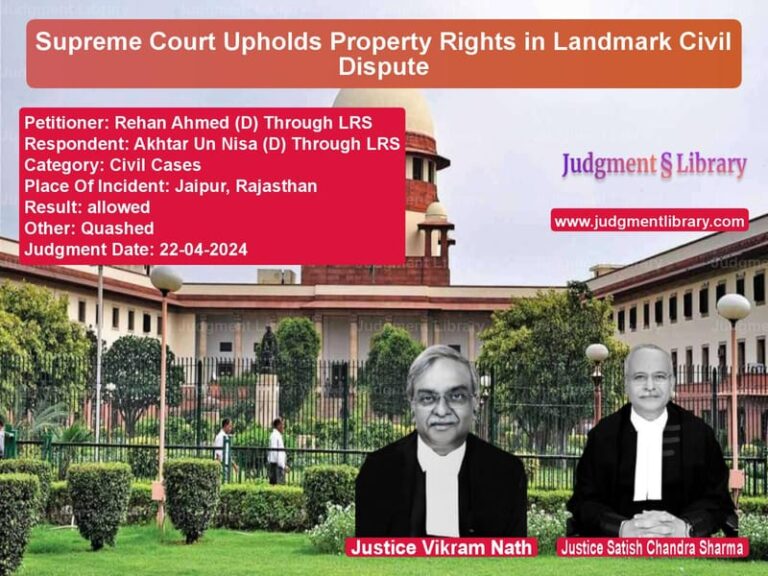Insolvency Proceedings Quashed: Supreme Court Rules on Pre-Existing Dispute in Debt Recovery
The Supreme Court of India, in M/S. Jai Balaji Industries vs. D.K. Mohanty & Anr., addressed a crucial legal issue concerning the initiation of Corporate Insolvency Resolution Process (CIRP) under the Insolvency and Bankruptcy Code, 2016 (IBC). The Court ruled that insolvency proceedings cannot be initiated if a pre-existing dispute regarding the operational debt is pending adjudication. This judgment sets a significant precedent in cases involving arbitration awards and debt enforcement through the IBC.
Background of the Case
The case arose from a dispute between M/S. Jai Balaji Industries (Operational Creditor) and Orissa Minerals Development Company Limited (Corporate Debtor), concerning the supply of iron ore under two Memorandums of Understanding (MoUs) dated August 13, 2003, and March 11, 2004.
Due to alleged non-compliance by the Corporate Debtor regarding iron ore supply and payment, the dispute was referred to arbitration. The arbitral tribunal, in its awards dated February 15, 2010, and February 22, 2010, directed the Corporate Debtor to pay Rs. 4.44 crores and Rs. 2.79 crores, respectively, to the Operational Creditor.
Subsequent Legal Proceedings
The Corporate Debtor challenged the arbitral awards under Section 34 of the Arbitration and Conciliation Act, 1996. These petitions were dismissed by the District Court, Barasat, in 2012. The Corporate Debtor further appealed under Section 37 of the Act before the Calcutta High Court. However, these appeals were dismissed in default due to non-appearance on November 22, 2019.
On December 17, 2019, the Corporate Debtor filed applications for restoration of appeals, which were allowed on March 2, 2020.
Initiation of Insolvency Proceedings
Before the restoration of appeals, on February 14, 2020, the Operational Creditor issued demand notices under Section 8 of the IBC, claiming outstanding operational debts based on the arbitral awards. The Corporate Debtor responded on February 25, 2020, asserting the existence of a dispute due to pending arbitration-related appeals.
Despite this response, the Operational Creditor moved the National Company Law Tribunal (NCLT), Kolkata Bench, seeking initiation of CIRP under Section 9 of the IBC. The NCLT, in its order dated September 30, 2020, admitted the applications and initiated insolvency proceedings, reasoning that no dispute existed on the date of demand notice issuance.
Read also: https://judgmentlibrary.com/supreme-court-directs-reconsideration-of-arbitration-in-msme-dispute/
Appeal Before NCLAT
The Corporate Debtor appealed the NCLT order before the National Company Law Appellate Tribunal (NCLAT). The key argument was that restoration of appeals under Section 37 of the Arbitration Act revived the dispute, making the operational debt ineligible for insolvency proceedings.
The NCLAT ruled in favor of the Corporate Debtor, holding that once an appeal is restored, it relates back to the original date of filing. The tribunal emphasized that the IBC cannot be used as a substitute for debt recovery when a dispute is pending adjudication.
Arguments Before the Supreme Court
Operational Creditor’s Arguments:
- The dispute ceased to exist when the appeals were dismissed on November 22, 2019.
- The demand notice was issued in February 2020 when no legal challenge to the arbitral award was pending.
- The restoration of appeals in March 2020 was a subsequent event that should not affect the insolvency proceedings.
Corporate Debtor’s Arguments:
- The appeals were restored on March 2, 2020, before the insolvency application was filed on March 2, 2020.
- The principle of relation back applied, meaning that restoration revived the dispute retroactively.
- The IBC is not a debt recovery mechanism and should not be used when a pre-existing dispute exists.
Supreme Court’s Ruling
The Supreme Court upheld the NCLAT’s decision and quashed the insolvency proceedings, ruling that a pre-existing dispute existed under Section 8(2)(a) of the IBC.
On the Principle of Pre-Existing Dispute:
The Court reaffirmed that insolvency proceedings cannot be initiated when a dispute regarding the debt exists. It cited the case of Mobilox Innovations Pvt. Ltd. vs. Kirusa Software Pvt. Ltd., stating:
“The adjudicating authority must reject an application if there is a plausible contention that a dispute exists. The objective of IBC is not to facilitate mere debt recovery.”
On the Relation Back Principle:
The Court ruled that restoration of appeals relates back to the original filing date, thereby maintaining the legal status of a dispute at the time of demand notice issuance.
“Once an appeal is restored, it revives the entire proceedings, negating the basis for insolvency action.”
On the Purpose of IBC:
The judgment reiterated that the IBC is meant for resolving insolvency, not for enforcing debt recovery.
“IBC is a remedial legislation for insolvency resolution, not an alternative to money recovery suits or arbitration proceedings.”
Impact of the Judgment
The ruling has major implications for insolvency law:
- Strengthens safeguards for corporate debtors against misuse of insolvency proceedings.
- Clarifies the application of IBC when arbitration or litigation is pending.
- Reinforces the doctrine of relation back in restoration of dismissed cases.
- Prevents operational creditors from using IBC as a coercive tool for debt enforcement.
Conclusion
The Supreme Court’s ruling in this case reinforces the principle that insolvency proceedings cannot be used as a mere debt recovery mechanism. By recognizing the restoration of appeals as maintaining a pre-existing dispute, the judgment ensures that corporate debtors are protected from premature insolvency actions. This case sets a crucial precedent for the interpretation of ‘dispute’ under the IBC, maintaining the balance between creditor rights and corporate debtor protection.
Petitioner Name: M/S. Jai Balaji Industries.Respondent Name: D.K. Mohanty & Anr..Judgment By: Justice Dinesh Maheshwari, Justice Vikram Nath.Place Of Incident: Kolkata, West Bengal.Judgment Date: 01-10-2021.
Don’t miss out on the full details! Download the complete judgment in PDF format below and gain valuable insights instantly!
Download Judgment: ms.-jai-balaji-indu-vs-d.k.-mohanty-&-anr.-supreme-court-of-india-judgment-dated-01-10-2021.pdf
Directly Download Judgment: Directly download this Judgment
See all petitions in Arbitration Awards
See all petitions in Dispute Resolution Mechanisms
See all petitions in Bankruptcy and Insolvency
See all petitions in Judgment by Dinesh Maheshwari
See all petitions in Judgment by Vikram Nath
See all petitions in dismissed
See all petitions in Quashed
See all petitions in supreme court of India judgments October 2021
See all petitions in 2021 judgments
See all posts in Arbitration and Alternate Dispute Resolution Category
See all allowed petitions in Arbitration and Alternate Dispute Resolution Category
See all Dismissed petitions in Arbitration and Alternate Dispute Resolution Category
See all partially allowed petitions in Arbitration and Alternate Dispute Resolution Category







